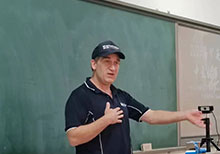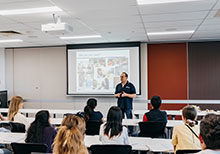Profile
I have been an academic for close to 20 years and are currently a senior lecturer in Information Technology for the Insititute of Innovation, Science & Sustainability at Federation Univesity. I have been coordinating and lecturing regularly in China since 2012. Currently I lead the academic team based at the FedUni Information Engineering Institute based within the Hebei University of Science & Technology in China. During those years I have held a number of key positions within univeristy including:- Associate Dean (FedUni Information Engineering Institute
- Partner Academic Lead (2024 ongoing).
- Discipline Lead of IT: Global Professional School (2021-2024).
- Human Research Ethics Committee (Staff rep>Acting Chair).
- Program Coordinator Bach.IT: Games Design (2021- 2022).
- Program Coordinator Graduate Diploma of Computing (2021-2022).
- Associate Dean (Student Retention and Success) (2015-2018).
- Chair of Academic Progress Committee (2015-2021).
- Chair of the Information Technology Industry Advisory Group (2016-2022).
- Discipline Coordinator/Program Coordinator for GAIMM (2013-2014).
- Discipline Coordinator for Melton campus (2013).
- First year/Transition Coordinator (2010-2013.)
- Discipline Coordinator CT3 & CT5 first year(2011-2013).
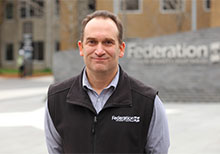

Research
I have researched across key areas of emerging technologies, student learning, educational inclusion, ethics, simulation and virtual worlds. I lead the Technologies for Empowering People for Participation in Society (TEPPS) research group. The TEPPS programme aims to enable the lives of people the world over through the radical design of software and hardware solutions called "Assertive Technologies". TEPPS are designed through close target user collaboration and have the aim of empowering peoples' lives. The TEPPS programme focuses on researching, designing, implementing and evaluating simple, accessible and cost-effective enabling systems. Another focus of the TEPPS programme is to research equity in terms of health support provision and quality of life issues.Close target user informed design and key stakeholder collaboration are key priorities for any ventures that the TEPPS programme decides to explore. Universal design is a priority in order to create appeal and to encourage uptake for a product beyond the intended target audience. By carefully simplifying design you can maximise the user experience and enhance interaction. Projects range in nature from immersive virtual worlds with rich interactions and three dimensional environments, through to DVD-based applications and simple web-based interfaces. TEPPS sought to form collaborative partnerships within industry, government bodies, community organisations and academics. Examples of past and current relationships, and collaborations include Australian Speak Easy Association; The Australian McGuire Programme; and The Australian Stuttering Research Centre.
Based on my work through TEPPS I was awarded The Federation Alumnus of the Year in 2015 and I lead the University's first successful crowdfunding project in 2016. I full list of my academic endeavours can be found HERE.

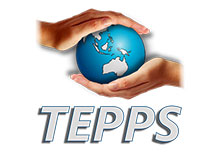
E's Learning
The 9E's (ease) Learning model is a self-developed pedagogy that drives how operate as an educator, how I interact with students and how I train staff. It encapsulates 9 nodes to provide a holistic approach to educating. These nodes all apply at student, unit and course (degree) levels.- Enabling: Enabling students to embed themselves more into current and future curriculum. Enabling the students to see the real life application of taught theory and skills. Enabling the educator to feel fulfilled and satisfied with the materials, class structure and learning outcomes.
- Enlightening: Students are presented with relevant unit materials and glimpses into the wider world beyond. New knowledge is taught and established, perspectives are altered. Through close interactions and conversations with the class, the educator is offered different views and perspectives about the taught materials, assessments and alternate viewpoints.
- Evolutionary: The educator, teaching style, unit content and student learning all evolves throughout the taught causes. Course materials and assessments change over time through class contact, student feedback and educator-student interaction.
- Empowering: The student feels empowered during the unit by helping to direct its current and future state. The lecturer feels empowered by having carefully prepared materials and assessments tools, along with a mastery of the unit knowledge. Constant revision and reflection aids with the student feeling connected to the ongoing curriculum and gives them understanding of how all the materials tie together.
- Everywhere: Examples tied into unit materials are drawn from real life examples to add authenticity to the unit content in both the eyes of the students and the educator. Learning is everywhere and accessible. Teaching is xpanded beyond the tight confines of the class-room and rigidity of the book form. Students are asked to look beyond the class materials for application and inspiration.
- Entertaining: Learning and teaching must be entertaining for all parties involved. It encourages active participation and encourages further exploration by all parties. This could be via mannerisms, examples, assessments and activities.
- Encouraging: The educator encourages the student to learn, explore and evolve throughout the course materials and beyond. This may occur via materials, the learning environment and teaching style involved. Students at all levels of understanding are encouraged to further participate and push themselves. In turn the educator is encouraged further to explore their pedagogical practices.
- Enriched: Technology, media and pedagogy are used to present an enriched medium to learn and teach from. New methods and tools to aid teaching and learning are explored and validated by all. Multimedia, web technologies and emerging technologies are used appropriately and via an informed approach.
- Everyone: Materials are designed and presented in way that benefits different learning styles, different cultural backgrounds and lifestyles. Materials are developed to enable confidence in teaching and learning. Unit materials are presented in through accessible means to the student through learning management systems and emerging technologies. Materials are created and presented through means and fashions that both the student and educator is comfortable with.
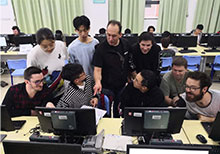
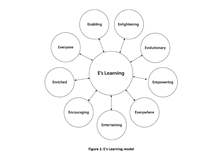
Supervision
Doctor of Philosophy
- (ongoing), Jordan Greenwood. "Academic-Industry Divide: Australian - New Zealand Video Games Sector".
Graduate Certificate in Research
- 2024, Dai Yi. "First person shooter gaming community perceptions of game communication model".
Honours degree
- (ongoing) Hao Sun. The use of augmented reality for childhood household safety training.
- 2023, Jundi Liang. Proposing a Blockchain-Based Software License Management Model with Resalable Licenses: A Study of User and Developer Perspectives.
- 2023, Yishi Liu. The Effectiveness of Projected Augmented Reality to Teach Balance and Coordination to Children.
- 2019, Jordan Greenwood.Motivations and Gaming Habits of Australian Mobile Gamers
- 2009, Joel Thewlis.Evaluating the Effect of Visually Induced Head Movement on Attitudes of Video Game Players.
Graduate Diploma of Advanced Computing
- 2010, Troy Neenan. Evaluating the Effect of Visually Induced Head Movement on Attitudes of Video Game Players.
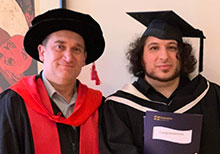
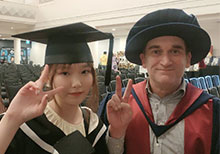
Awards
- 2020: School of Engineering, Information Technology and Physical Sciences Staff Excellence Awards – Award for International Academic Partnerships.
- 2018: Teacher Appreciation Award. Ballarat Baha’i Community.
- 2015: Federation University Australia’s Alumnus of the Year.
- 2013: Leading vote getter (University of Ballarat) Unijob’s “Lecturer of the Year” competition.
- 2011-2012: Top 10 voted lecturer (University of Ballarat) “Lecturer of the Year” competition.
- 2011: Vice Chancellor’s Award for Excellence (Innovation).
- 2011: Vice Chancellor’s Award for Excellence (Service).
- 2010: Pro Vice Chancellor’s (Research) Award.
- 2010: Leading vote getter (University of Ballarat) Unijob’s “Lecturer of the Year” competition.
- 2010: High Quality Teaching Appreciation Award: University of Ballarat Saudi Arabian Student Society.
- 2009: Leading vote getter (University of Ballarat) Unijob’s “Lecturer of the Year” competition.
- 2008: Leading vote getter (University of Ballarat) Unijob’s “Lecturer of the Year” competition.
- 2006: Vice Chancellor’s Team Excellence Award.
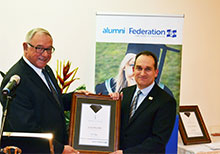
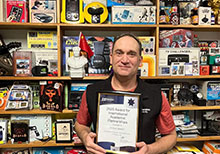
Funding
Research related
- 2022 SummerTechLive “Main Street Revelations”, Victorian Chamber of Commerce and Industry.
- 2021 SummerTechLive “Local STEAM Heroes augmented reality art project GippsTech”, Victorian Chamber of Commerce and Industry.
- 2021 RES Funding (Augmented Reality to develop primary school students’ balancing skills), SEITPS.
- 2020 RES Funding (Augmented Reality), SEITPS.
- 2019 SSEIT RSP (Virtual Reality Pt.2).
- 2019 SSEIT RSP (Virtual Reality Pt.1).
- 2016/2018 NHMRC program grant “Development and Evaluation of an Internet-based Clinic for Stuttering”. NHMRC GNT1132370.
- 2015 “Scenari-Kids: Empowering the Future”, Telematics Trust.
- 2014 "Scenari-Aid: Empowering people to succeed", Pozible Crowdfunding.
- 2012 “Facing the Fear: Simulated Social Environments for People who Stutter”, Telematics Trust.
- 2012 Engagement grant, ACDICT.
- 2010 Telematics Trust small grant, Telematics Trust.
- 2010 HMST Small Grant¶, Helen Macpherson Smith Trust.
- 2010 RIGB funding, University of Ballarat.
- 2009 HE Incentive grant, University of Ballarat.
Non-Research related
- 2023 New Colombo Plan (34806), Australian Federal Government.
- 2022 New Colombo Plan (34184), Australian Federal Government.
- 2020 New Colombo Plan (30808), Australian Federal Government.
- 2019 New Colombo Plan (25951-53), Australian Federal Government.
- 2016-18 New Colombo Plan (15942), Australian Federal Government.
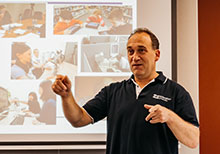
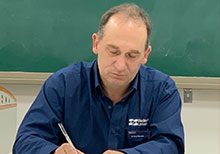
Subjects
Subjects that I have taught and coordinated include:- CP752 Internet Courseware.
- CP642/872 Introduction to Multimedia.
- CP691 Interactive 2D Animation
- CP762 3D Animation & VIsual Effects.
- ITECH1001 Communications & Technology;
- ITECH1004/5004 Introduction to Multimedia.
- ITECH1100 Understanding the Digital Revolution;
- ITECH1101 IT Problem Solving.
- ITECH2001 Games Development Fundamentals.
- ITECH2003 Web Design.
- ITECH2106/6106 Webpage and Multimedia Design.
- ITECH2112 Interactive Instructional Design.
- ITECH2118 Industry Awareness (Computer Games & Digital Media).
- ITECH2250 IT Project Management Techniques.
- ITECH3000 IT Professional Engagement.
- ITECH3001 User Experience.
- ITECH3103 IT Strategy & Governance.
- ITECH3200 Professional Experience.
- ITECH3208 Project 1.
- ITECH3209 Project 2.
- ITECH3222 Compter Games Design
- ITECH3225 Internet Courseware.
- ITECH3231 Web-based Interactive Instructional Design.
